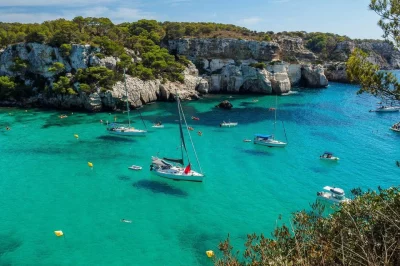 Political leaders in Spain are currently in conflict over the new gambling laws unveiled by one of the most popular tourist destinations in the country – the Balearic Islands – situated off the Spanish Eastern coast. The area is made up of several major islands, including Majorca, Ibiza, Minorca, Cabrera and Formentera.
Political leaders in Spain are currently in conflict over the new gambling laws unveiled by one of the most popular tourist destinations in the country – the Balearic Islands – situated off the Spanish Eastern coast. The area is made up of several major islands, including Majorca, Ibiza, Minorca, Cabrera and Formentera.
The Balearic Islands are a province of Spain and an autonomous community within the country. Politically, the area has a certain degree of freedom and autonomy from the central authority. Currently, the Balearic Islands are ruled by a 59-seat Parliament.
According to official government reports, for the time being, there are 108 casinos, betting establishments, and gaming halls on the Balearic Islands. Reportedly, this is the region with the third-highest relative number of gambling venues in the entire country and a popular tourist destination. As the National Institute of Statistics revealed, the archipelago was visited by 16.3 million tourists in 2022. In comparison, the population of the Balearic Islands is a little over 1.1 million.
New Gambling and Betting Law Seeks to Ban All Gambling Advertising on the Balearic Islands
 At the end of 2022, the Balearic Islands presented their updated Gambling and Betting Law, which was officially approved by the Government Council in December. As the Government revealed in a statement at the time, the main objective of the legislation update was to protect the most vulnerable social groups and ensure a legal and safe gambling environment for both residents and visitors of the islands, and also to address the need to plan the gambling venues’ location.
At the end of 2022, the Balearic Islands presented their updated Gambling and Betting Law, which was officially approved by the Government Council in December. As the Government revealed in a statement at the time, the main objective of the legislation update was to protect the most vulnerable social groups and ensure a legal and safe gambling environment for both residents and visitors of the islands, and also to address the need to plan the gambling venues’ location.
The most notable update in the local gambling laws, which turned out to be the most controversial as well, was the one aimed at suspending gambling advertising. Under the original language of the regulatory move, advertising of gambling houses, platforms and casinos is banned on the Balearic archipelago without exception. In addition, the provisions of the new law seek the establishment of a minimum distance of 1,640 feet between local schools and gambling establishments.
The move has won the support and approval of Juan Pedro Yllanes, the community’s second-in-command. The measure seeking an advertising ban, however, faced the opposition of the right-wing Spanish Socialist Workers’ Party (PSOE). A number of other neutral and right-wing parties also disagreed with the suspension of gambling advertising.
Proposed Gambling Changes on the Archipelago Lead to Political Tension
 The fact that lawmakers have been at odds because of the proposed stricter gambling rules has caused political tension and rift, which escalated during the penultimate session of the local Legislature that took place earlier this week. At the time, a political debate was held over the Gambling and Betting Law, with some left-wing politicians from socialist parties stepping away and siding with their right-wing colleagues.
The fact that lawmakers have been at odds because of the proposed stricter gambling rules has caused political tension and rift, which escalated during the penultimate session of the local Legislature that took place earlier this week. At the time, a political debate was held over the Gambling and Betting Law, with some left-wing politicians from socialist parties stepping away and siding with their right-wing colleagues.
The Spanish Socialist Workers’ Party and the People’s Party have been rivals for quite some time. Now, the fact that they have decided to partner on the gambling legislation changes has indicated that the gambling debate on the Balearic Islands has gotten serious.
The aforementioned piece of legislation was eventually forced to include an amendment allowing advertising in brochures and so-called dynamic advertising of casinos. It also reflects a wider acceptance of advertising materials regarding complementary services available in various tourist establishments, airports, and ports.